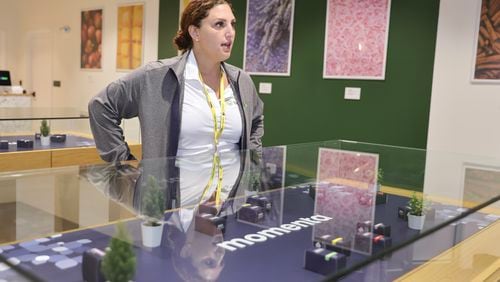A federal plan to reclassify marijuana as a less dangerous drug could increase access for medical marijuana patients in Georgia, allowing pharmacy sales, health research and greater acceptance by doctors.
Marijuana would remain illegal for recreational use in Georgia, but the proposal by the U.S. Drug Enforcement Administration on Tuesday could expand the state’s medical marijuana program, which currently serves about 18,000 registered patients through nine dispensaries.
The most direct impact would be to allow hundreds pharmacies to distribute medical marijuana, which is permitted under state law but was halted last year when the DEA warned that doing so could violate federal law. Georgia would have become the first state in the nation to authorize pharmacies to dispense the drug.
“This will save patients from the difficulties they’re having in obtaining medical marijuana,” said Dawn Randolph, CEO of the Georgia Pharmacy Association. “While this sounds exciting, the path forward is very long and arduous. We’re talking about determining proper dosing, monitoring adverse effects and preventing drug-to-drug interactions. There’s just so much involved here.”
If the DEA’s proposal is approved, the government would move marijuana from its current classification as a Schedule I drug, which covers substances with no accepted medical use and a high potential for abuse, such as heroin and LSD. Instead, marijuana would become a Schedule III drug, alongside ketamine, anabolic steroids and some acetaminophen-codeine combinations.
Georgia’s first medical marijuana dispensaries opened a year ago, and the state’s program is growing. The number of active medical marijuana patients has grown from 13,000 last summer to an estimated 18,000 today.
Reclassifying marijuana would benefit patients and businesses, said Gary Long, CEO of Botanical Sciences, one of Georgia’s six licensed medical marijuana companies.
“It’s great for Georgia patients and pharmacists, and hopefully Georgia physicians are now going to be a little less concerned about recommending a medicine that had been on Schedule I,” Long said. “There’s now a formal recognition that it does have a medical benefit.”
Georgians are eligible for medical marijuana cards with approval from a physician to treat several severe illnesses, including seizures, terminal cancers, Parkinson’s disease and post-traumatic stress disorder. The oil can have no more than 5% THC, the compound that gives users a high.
The cards cost $25 and are valid for two years before they need to be renewed.
Michael Mumper, executive director of Georgians for Responsible Marijuana Policy, warned that reclassifying marijuana comes with health risks.
“Rescheduling ignores the addictive and mental health implications of increasingly high potency THC and more frequent use,” Mumper said. “There is a high likelihood of addiction, psychosis and schizophrenia, as reported by the CDC. ... We should be wary that increased marijuana normalization leaves more Georgians vulnerable to mental health issues.”
Patients say that medical marijuana provides relief from illnesses such as seizures that traditional pharmaceutical drugs couldn’t treat.
Thirty-eight states, including Georgia, have medical marijuana programs, and recreational cannabis is allowed in 23 states.
Georgia has allowed medical marijuana consumption since 2015, but the state didn’t authorize the production and distribution of the drug until a state law passed in 2019. Then it took four more years to award licenses and open the state’s first dispensaries.
The proposal to reclassify marijuana will next be reviewed by the White House Office of Management and Budget, and then it will undergo a public comment period and review by an administrative judge. The process could take years.
“We’re hopeful to see dispensing at hundreds of independent pharmacy locations all across the state,” said Andrew Turnage, executive director of the Georgia Access to Medical Cannabis Commission. “We’ll watch and wait and hope it brings good news for Georgia patients.”
— The Associated Press contributed to this article.
About the Author








